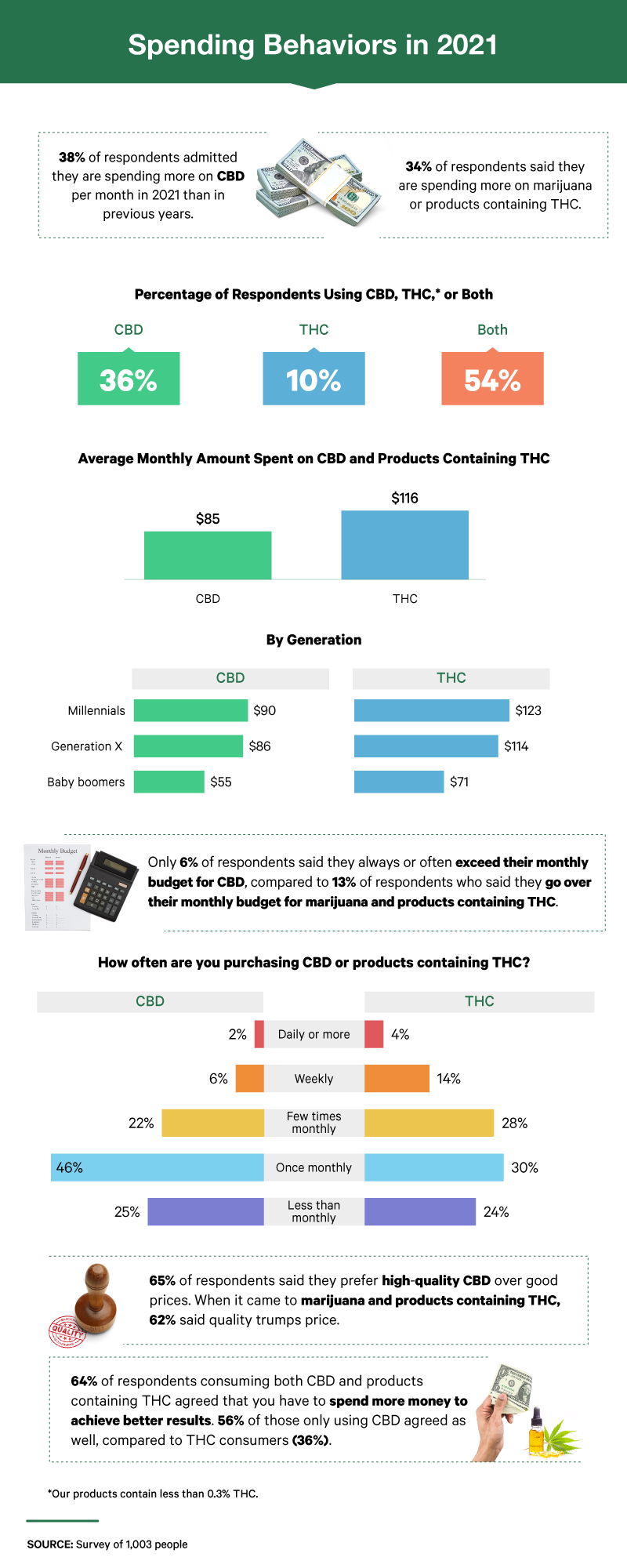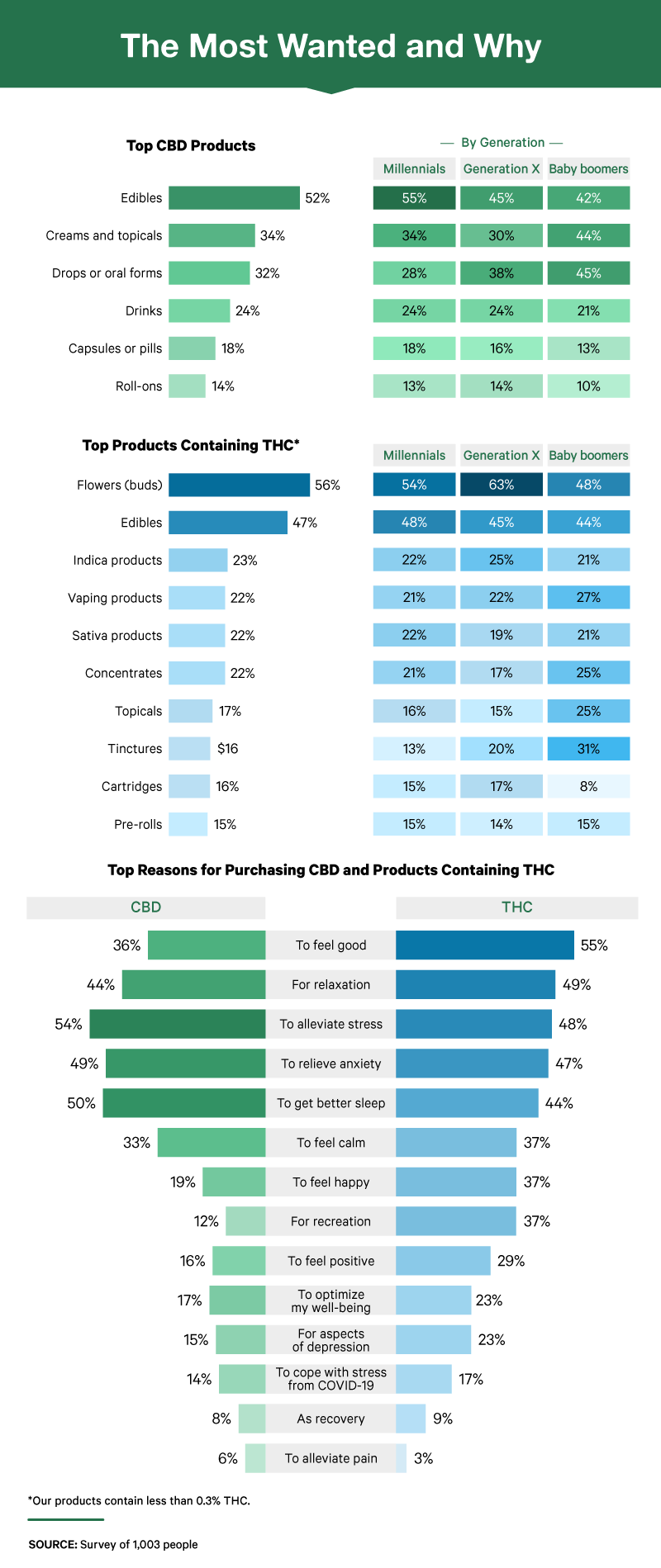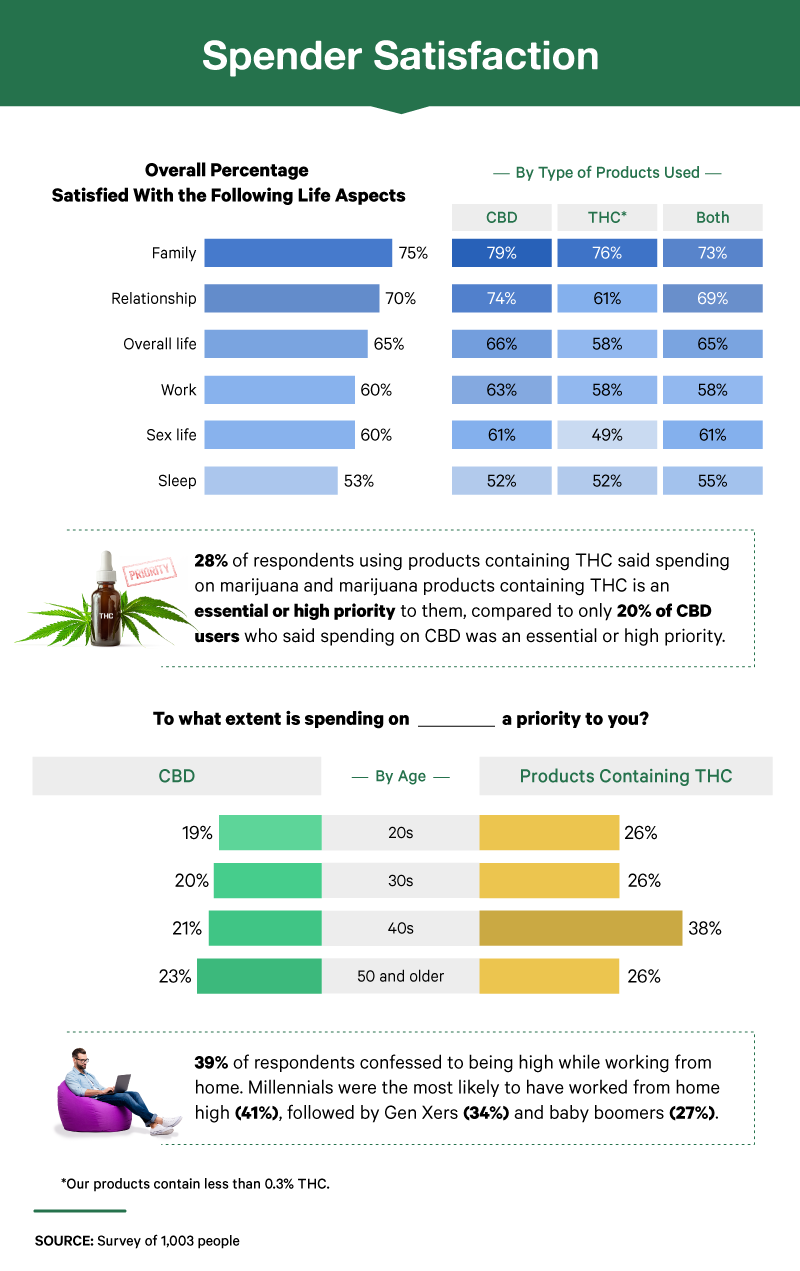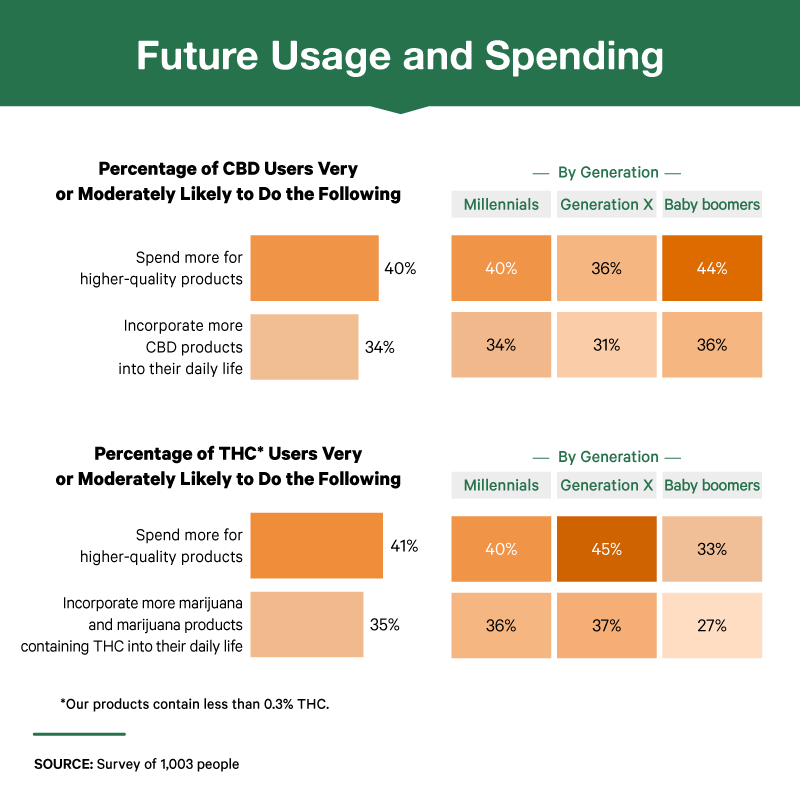The global COVID-19 pandemic has created more than one health crisis in America. Not only are people worried about protecting their physical health, but after a full year of self-imposed quarantine and lockdown, they’re battling a mental health crisis, too. The pandemic has disrupted work, school, social interactions, and virtually every aspect of our lives, leaving a messy wake of skewed work-life balance, strained personal relationships, and still no end in sight.
For Americans, there may be no getting back to “normal” yet, but there are other solutions. Studies show cannabidiol (often referred to as CBD) has the capacity to help alleviate stress and anxiety. Legal in all 50 states with varying degrees of restriction, CBD may have the potential to offer a reprieve for Americans burned out during the pandemic.
So how many people are using CBD or marijuana in 2022, and how much money are they spending on it? To find out, we surveyed over 1,000 people about their consumption habits and spending in the last year. Let’s take a closer look as we explore which products people are more frequently buying; why they’re using CBD or THC; how happy CBD and THC users are with their life; and how much money they’re spending on a regular basis.
Changes in Use During COVID-19
In 2021, people surveyed acknowledged spending more money on CBD per month than they have in previous years, and 34% said the same about marijuana or THC products. And while more than 1 in 3 respondents exclusively use CBD products, people more commonly reported using both THC and CBD (54%). CBD is most popularly noted for its potential health benefits, but THC in marijuana also has its health uses. Studies show THC has the potential to help with sleep, anxiety, and muscle spasticity. Among those surveyed, the average person spent more money per month on THC products ($116) than they did on CBD products ($85).

Spending on marijuana, including both THC and CBD products, was highest among millennials, who, on average, reported spending $90 per month on CBD and $123 on THC. Generation X respondents weren’t far behind, reporting average monthly spending of $86 on CBD and $114 on THC. Baby boomers lagged behind the furthest, spending $55 per month, on average, on CBD and $71 per month on THC products. Regardless of age, 6% of respondents said they either always or often exceed their monthly budget for CBD products, compared to 13% of those reporting the same of THC products.
Compared to 46% of people purchasing CBD products once per month and 30% of THC users with the same frequency, we found 22% of respondents acknowledged purchasing CBD multiple times per month, and 28% said the same of THC. Just 14% of THC users reported purchasing on a weekly basis, and only 4% said they purchased THC daily or more. When it comes to how much they’re spending, 65% of respondents said they prioritize the quality of their CBD products over the price, and 62% said the same of marijuana or THC products.
CBD and THC Use Goals
Among CBD users, we found the most popular forms or products were edibles (52%), followed by CBD creams or topicals (34%), drops and oral forms (32%), and CBD drinks (24%). Compared to both millennials and Generation X Americans, baby boomers were the most likely generation to report preferring CBD creams (44%) or drops (45%).

Among THC users, the most popular forms or products were the flowers or buds (56%), followed by edibles (47%), indica products (23%), and vaping products (22%). While millennials most often reported preferring edibles (48%) and sativa (22%), Gen X respondents were the most likely to prefer marijuana in flower form (63%), and baby boomers most often preferred vaping (27%).
CBD and THC users had different preferences for products, and they also reported different reasons for consuming in the first place. While THC users were most interested in feeling good (55%) and relaxing (49%), CBD users said their top reasons for consumption were to help alleviate stress (54%) and to get better sleep (50%). While studies are still ongoing, research indicates CBD can help support the causes of sleepiness, grogginess, or excessive daytime sleepiness.
Happiness at Work and at Home
Seventy-five percent of respondents indicated they were satisfied with their family, including 79% of CBD users, 76% of THC users, and 73% of people using both CBD and THC. Similarly, we found 70% were happy with their relationships, followed by their overall life (65%), work (60%), sex life (60%), and sleep (53%). CBD users were typically the most satisfied with various aspects of their life, including relationships (74%), sex life (tied at 61% with those using both), and work (63%). Respondents using both THC and CBD were also the most likely to be satisfied with their sleep (55%).

Compared to 20% of CBD users, 28% of respondents said buying products containing THC or marijuana was an essential or high priority to them. Among CBD users, those in their 40s (21%) and 50s or older (23%) were the most likely to indicate spending on CBD was a priority. Among THC or marijuana users, respondents in their 40s (38%) were far more likely to report similar spending was a priority in their life.
Increasing Their CBD and THC Budgets
In addition to their current spending, 40% of CBD users said they were either very or moderately likely to spend more to get higher-quality products, including 44% of baby boomers and 40% of millennials. Thirty-four percent of CBD users also indicated they were considering incorporating more CBD products into their daily life.

THC users (41%) were slightly more likely to report spending extra to get higher quality products, led by 45% of Generation X respondents and 40% of millennials. More than a third of THC or marijuana users said they were likely to incorporate more products into their daily life, including 37% of Gen Xers and 36% of millennials.
The Importance of Quality
2020 was a stressful year for most of us, and more than a third of CBD and THC users said they were spending more on those products in 2021 than they had in the past. Among those polled, THC users typically spent more money per month on products, compared to CBD users. However, CBD users were typically more satisfied with various aspects of their life, ranging from family and relationships to sex and work. And many CBD and THC users acknowledged they’re willing to spend more if it means getting higher-quality products.
At Gold Bee, we care about improving the human condition and the condition of our home planet. For this reason, we are passionate about bringing you various organic, non-GMO products of your choice this new year and on. Learn more about our organic products, customer reviews, and get to know the benefits of our legitimate CBD products for yourself at goldbee.com today!
Methodology and Limitations
We surveyed 1,003 people who consume either CBD or THC products. Among them, 545 respondents consumed both CBD and THC products, 361 only consumed CBD, and 97 consumed THC only. Fifty-four percent of respondents were men, and 46% were women. Respondents’ ages ranged from 18 to 79 years old with an average age of 36.
For generational breakdowns, our sample sizes were as follows:
- Millennials: 631
- Generation X: 219
- Baby boomers: 87
- Other generations were excluded: 66
For short, open-ended questions, outliers were removed. To help ensure that all respondents took our survey seriously, they were required to identify and correctly answer an attention-check question.
These data rely on self-reporting by the respondents and are only exploratory. Issues with self-reported responses include, but aren’t limited to, exaggeration, selective memory, telescoping, attribution, and bias. All values are based on estimation.
Fair Use Statement
Don’t stress about sharing the findings from this study. We simply ask that you include a link back to this page in any publication for noncommercial use so your readers have full access to our survey and methodology.
Note: Our products contain less than 0.3% THC.
